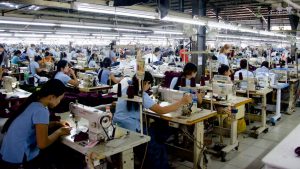THE RISK of conflict with China is emerging as an obstacle to Philippine attempts to improve its competitive standing in world markets and attractiveness to investors, the head of a competitiveness institute said.
Jamil Paolo S. Francisco, executive director of the Asian Institute of Management Rizalino S. Navarro Policy Center for Competitiveness, said Europe is particularly concerned about any factors that have the potential for disrupting trade in general.
“I suppose it’s obvious that (60% of global trade transits) the South China Sea and the West Philippine Sea, depending on who you ask,” he said.
“Of course, it is important to note that the maritime trade that passes through the South China Sea is mainly Chinese and Japanese trade to other countries,” he added.
However, Mr. Francisco said that any conflict that causes disruption in trade will have real effects on the economies of countries in the region, whether they are involved in the conflict or not, just because of the amount of trade that happens there.
The Philippines has been ranked 52nd in an annual global competitiveness report, lagging much of the Asia-Pacific.
The 2024 World Competitiveness Ranking compiled by Switzerland’s International Institute for Management Development (IMD) evaluated the prospects of 67 economies.
This year’s result marked the seventh year that the Philippines remained in 13th place out of the 14 Asia-Pacific economies studied in the report.
Mr. Francisco said that the West Philippine Sea issue was identified as something that could affect Philippine foreign direct investment, gross domestic product, and prices.
“Prices are one of the challenges that we have in terms of the rankings in economic performance. And the primary driver of inflation has been really food and energy,” he said.
“Because we rely heavily on imports of food and energy, if there’s any disruption in international trade because of conflict, imagine how that can impact us. So that’s what we mean when we say we need to try to mitigate the economic disruptions of political and regional conflicts,” he added.
In the IMD rankings, the Philippine standing in prices, an element of the economic performance ranking, dropped to 48th from 39th a year earlier.
The report also found that Philippine food costs, expressed as a percentage of household final consumption expenditure, came in at 58th out of 67 economies. — Justine Irish D. Tabile





